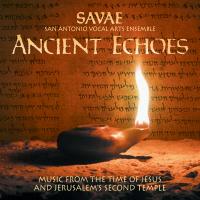Issue Date: April 18, 2003 Music echoes across centuries
Music echoes across centuries
Collection re-creates sacred songs Jesus might have heard 2,000 years ago By MATT STOULIL A new collection of sacred music, aptly titled “Ancient Echoes,” lets the Western world hear what Jesus and the people of Israel might have heard and sung around the turn of the first century. Religion and music have gone hand in hand since at least the time of the Second Temple in ancient Jerusalem, 538 B.C. to 70 A.D. Holy words and prayers were chanted then as now to add emotion and power to their meaning, and the use of instruments, stringed and percussive, added yet another dimension to the words of the prophets. What did that music sound like? Christopher Moroney’s knowledge of this music was limited in his early years. “My exposure to this music had always been soundtracks to Bible movies like ‘Ben Hur,’ ” said Moroney, the artistic director for the San Antonio Vocal Arts Ensemble, SAVAE, and one of the creative forces behind “Ancient Echoes.” Then, as a teenager, he heard some Egyptian music. “It was the first time I had heard authentic Middle Eastern music and when I heard this, I thought, ‘Oh, wow! It would be interesting to hear music from that time with these instruments and the sacred texts, the words of Jesus, the words from the Bible.’ But I didn’t know how it could possibly be done.” About three years ago, and nearly three decades after his first thoughts of authentic ancient music, Moroney discovered a book, Prayer of the Cosmos, by Neil Douglas-Klotz, which shed some much needed light on the subject. This book contained new translations of Jesus’ words directly from Aramaic, his spoken language. Western biblical translations come from Greek texts that have been translated from Aramaic. Said Moroney, “There is a lot of visual imagery and metaphors that are lost in the translation. These metaphors and visual imagery add a lot of depth to understanding the meanings of these prayers and sayings. So when we saw these [translations], something clicked, and we said now is the time to really go for this project.” Moroney, along with his wife, Covita Moroney, SAVAE founder and general manager, and the rest of the arts ensemble, spent hundreds of hours researching ancient languages, instruments and manuscripts in order to realize this musical vision. They learned to speak the dialect and play the instruments of early first-century Israel, dating back to King Herod’s Roman court. The fruit of their efforts appears on the World Library Publications release “Ancient Echoes.” The music draws from Jewish and Christian sources as well as Islamic influences to create a glimpse of what first-century sacred music might have sounded like. In order to convey appropriate musical tones, the Moroneys consulted Abraham Idelsohn’s Thesaurus of Hebrew Original Melodies. Idelsohn was a musicologist who settled in Jerusalem in the early part of the 20th century. He found a similarity between the chants of the various tribes of Jews from around the world, noting that many of the same texts would have the same melodies among the different tribes. Idelsohn collected these folk songs as the Jews were coming off the trains to resettle in Israel and Palestine. The correlation between the chants was surprising, since these different Jewish camps had been separated for centuries. Idelsohn also organized these texts with their correlating musical modes. Different texts would call for different modes, depending on the mood of the piece. These modes had tonal centers that correlated to the ancient Greek modes: The Dorian mode was used with inspirational texts, the Phrygian mode for texts with sentiment and the Lydian mode for confessional, lamenting texts. Many of the compositions on “Ancient Echoes” come from Idelsohn’s collected music research. In addition, applying Idelsohn’s groundbreaking musicological research, Moroney composed melodies for excerpts from the Dead Sea Scrolls as well as various sayings and prayers from Jesus’ time. One such piece on the “Ancient Echoes” album is “Rannanu (Sing with Joy),” which comes from a prayer in the Dead Sea Scrolls celebrating the worship of God in the heavenly temple. The simple elegance is complemented by a rhythmic Middle Eastern drum pattern in the second half of the song: Sing with joy, you who rejoice in His “Abwoon (Father-Mother of the Cosmos)” is the Aramaic Lord’s Prayer set to music, and the prayer is initiated by the blowing of a shofar, or a ram’s horn trumpet, a priestly instrument. One can see the root of the current Christian Lord’s Prayer: Grant what we need each Other highlights from the album are versions of Beatitudes and “Wa Y’Daber Elohim (And God Spoke),” a musical version of the Ten Commandments from Idelsohn’s previously mentioned Thesaurus of Hebrew Original Melodies. “Ancient Echoes” is an un-Westernized view of the roots of religion. The varied instruments add earthy texture to the powerful and prophetic words of centuries ago. “We have had tremendous response from our audiences … in Christian churches as well as synagogues,” Moroney told NCR. “When you hear these instruments, and you hear this sound and you hear the sound of the language, it puts you that much closer to the actual person [of Jesus].” Through “Ancient Echoes,” SAVAE has created a visceral appreciation of sacred text for a 21st-century audience. Related Web site “Ancient Echoes” Matt Stoulil is NCR layout assistant, a bass player and an avid observer of the music world. Get in tune with him at mstoulil@natcath.org National Catholic Reporter, April 18, 2003 |